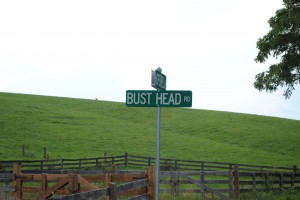This sign for Bust Head Road hit me square in the funny bone. I don’t expect to see a plethora of poplars on Poplar Lane, or anything resembling Honest Abe on Lincoln Avenue. They’re just names — something to distinguish one road or street from the next. But Bust Head Road is different. It evokes the question: why? Here are a few completely plausible reasons for naming an otherwise innocuous country road Bust Head.
Two hundred years ago a bloody clash between Cherokee and Sioux ended with the fatal head injury of beloved Sioux Chief Nipped-in-the-Bud. To honor the valiant conclusion of a noble life the chief’s son Two Dogs … well, you know the rest … declared the path between the warring tribes to be forever known as Bust Head.
The hermit who lives at the end of the road has an enormous affection for breasts.
From an altitude of ten thousand feet the winding road draws the perfect outline of an ample bosom mounted on top of a very round cranium — nipple pointing east, nose west.
A prominent eighteenth century American sculptor sought the perfect specimen of soapstone for his bust of frontier composer Nathanial Ages. He took a break from his search to have lunch. The spot he picked was quiet and sunny; a true delight save one annoyance — he couldn’t sit comfortably due to a large rock that occupied the choicest location away from the dirt road and nearest a pleasant brook. Rather than move on to another place he took a shovel from his pack and attempted to remove the impediment. To his delight and surprise he cried, “Eureka! This is the perfect bust head — my Rock of Ages!
It’s late. You’re channel surfing and happen upon live coverage of Neanderthal Extreme Combat. It’s the final match between Gurk McKenzie, the muscle-bound bruiser from the Bronx, and Johnny Chang, the waxed, trim, and sweat-free pretty boy of Asian persuasion. A blow-dried commentator wearing a blue blazer and regimental tie has managed to cop an interview before the bout. He asks Gurk what he’s going to try to do in this final round. Of course you guessed it. The big galloot (are there small galloots?) wipes his nose with his arm and says, “Gurk bust head.” With his prize money Gurk put his mother up in an ultra-modern two-story trailer on Bust Head Road, named for the champion’s brash prediction.
Let’s visit the teacher who has spoon-fed To Kill a Mockingbird to his junior English class. He’s led them in chapter reviews, shown the classic movie, provided history and vocabulary lessons that made the story come alive, and had the kids read aloud from the book. He’s done everything but invite Harper Lee to come in and tell the class why she created Atticus and Scout the way she did. Satisfied that his students will remember this book for the rest of their lives he courageously approaches Rudy Swill, a boy who could get hours of reading enjoyment out of a stop sign. Testing his skill as an educator he confidently asks: “Rudy, of all the people in this small southern town, why in your own words is Atticus Finch a hero — a worthy man — a man you would like to know or even be?” Rudy looked at the teacher, jaw agape, and shook his head. Every student turned to witness this moment of truth. Will Rudy, world-famous blockhead Rudy, detention-lifer Rudy, come forward with some indication that he has gotten something from eleventh grade English? The teacher repeats the question calmly, succinctly. Rudy drools. The teacher is sweating. He loosens his collar and clears his throat and says, “Rudy, never mind the first question; instead tell me why is it a sin to kill a mockingbird?” Rudy runs his pencil up and down the spine of his spiral notebook and gazes vacantly at the ceiling. Then he lowers his head, smiles at the teacher, and says with every molecule of sincerity he can muster, “You can’t eat ‘em?” The classroom erupts in a collective hush. The clock on the wall ticked a new minute. Somewhere a dog barked. On that terrible day when an earnest teacher laid it all on the line before an impressionable jury of juniors a bright sign, make it neon, flashed before his eyes similar to the all-familiar, “In Case of Fire Break Glass.” This sign said, “In Case of the Complete, Total, Lack of One Single Solitary Idea, Bust Head.” Bust head were the teacher’s last words. Following the heart attack he was laid to rest in the family cemetery at the end of Bust Head Road, renamed to honor that terrible moment of frustration and anger.
If you really bust head, I’ll bet you can come up with a few more reasons to explain the curious naming of Bust Head Road.
